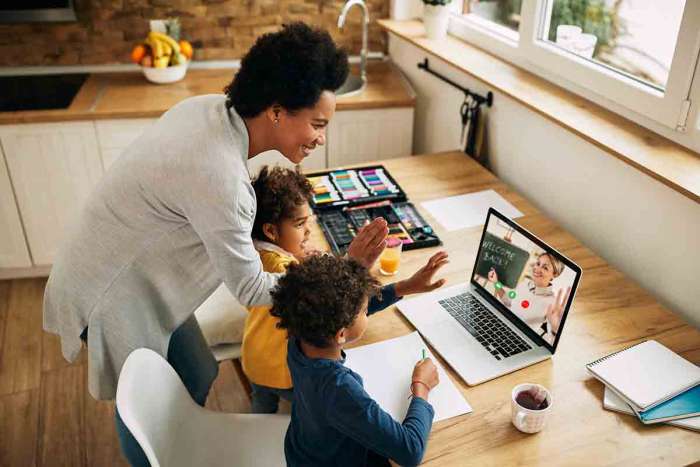Editor's Note: This article was written in partnership with FamilyEducation’s sister site, TeacherVision.com.
We are living in difficult times due to the coronavirus. As the new Omicron variant spikes across the globe, many parents are worried about whether there will be more lockdowns and schools will close again.
One of the most affected groups of people during the COVID-19 pandemic is young children. Many kids have been facing less time out with friends and extended family members, as well as virtual learning due to school closures and childcare closures. Even with in-person learning still available, more kids are staying home and missing school for up to two weeks if they (or a family member) tests positive for COVID-19.
All of this uncertainty and time spent at home greatly affects kids’ emotional well-being and mental health and it's our jobs as parents to help them cope during this time in their lives. So what can you do to help your children? Here are some ways you can support kids and their schooling during COVID isolation.
1. Set a Routine for Home Learning

The biggest thing that will change during COVID isolation is the routine. Distance learning comes with its own set of challenges for both parents and children. Their usual school day has a structure, which includes particular subjects during specific times of the day. Establishing a new routine at home will be extremely helpful because then your child will know exactly what to expect. This can give them a sense of normalcy until they go back to school.
Will My Pregnancy Be Like My Mom's?
If there’s one thing we can all agree on, it’s that pregnancy is pretty unpredictable. However, it doesn’t have to be nine months filled with unanswered questions and wondering what fate has in store for you. It can feel like grasping at straws when figuring out where to start when you first learn you are pregnant. Read More
2. Keep Them Engaged

Some children are visual learners and having support tools can make things a lot easier and smoother for them while they are working on their schoolwork at home. Switching from in-person learning to learning at home is a huge change and it can take some time to adjust. Our number one priority is to help kids stay as focused and engaged in their schoolwork as we can. If you want to check their progress and see if there are areas they are struggling in, you can use some free self-assessments for several subjects. These can help you figure out what they should spend more time on so they can improve their skills.
3. Make Home Learning Fun with Educational Activities

Learning doesn't have to stop when school is over. Show your children that learning can be turned into super fun activities that you can do together. Take a break from Zoom classes and textbooks to do some crafts and creative projects with your kids. Things like creating educational posters or dioramas can help your kids learn about history. Going on a nature walk through the woods can be a great way for kids to learn about their surroundings, and pick up some basic life skills.
If you’re not sure how to make your own home learning activities, there are many ideas for educational games already online for free! If you are looking for some examples here are 30 fun math activities and 30 fun writing activities to choose from. There are options for preschoolers up to high schoolers.
4. Have a Designated Area for E-Learning

Just like you can’t do your job your best, laying in your bed, kids need to create a special space for school and learning. Bedrooms are full of too many distracting toys and electronics.
Outside distractions will make it more difficult for your child to concentrate on their schoolwork. If you have a home office, you may be able to set up a quiet workspace for them there. If not, you can use the kitchen or dining room table or a desk in another room in your home. A specific space for school can make a big difference.
5. Practice Self-Care for Kids

Taking care of yourself and encouraging your little ones to take care of themselves is already important, but even more so during social isolation. Their emotional well-being is going to be most affected during this time. It may feel like you are not doing the best for them but keeping them healthy is crucial. You will just need to be more present to help your children cope. Self-care can look like many things. This can be taking a nap, playing their favorite game. For older children, self-care during COVID may be as simple as having time to listen to music or watch Netflix for half an hour. Whatever activity that your child uses to unwind will work perfectly.
6. Prevent COVID Loneliness by Talking to Loved Ones

Another factor that can affect children's mental health is loneliness. If you typically visit family members frequently, that may have to be put on hold to help stop the spread of COVID-19. Something as simple as adding a video chat with a grandparent to their daily schedules can make a big difference during quarantine. Remember, their emotional and mental health is going to have an impact on how they perform in school.
How TeacherVision Can Help
When it comes to learning at home, TeacherVision has many free resources that you can use to support your child's learning as well as bridge some gaps. These can be helpful during and after school hours. There is even a free membership you can sign up for. If you feel like your little one is falling behind, don't worry. Every child is different and it can take longer for some to adjust than others. You can even connect with your child's teacher if you have any big concerns.
The Bottom Line
Social distancing is difficult for all of us, especially our children. Younger children are still learning to regulate their emotions and it is harder for them to cope when their whole world has been turned upside down by the COVID-19 pandemic. There are several steps everyone can take to minimize the spread of COVID-19. Simple practices such as proper handwashing, wearing masks, physical distancing, and quarantine if you have been in close contact with someone exposed, or if you are experiencing symptoms of COVID-19. There is a lot of misinformation that is being passed around about the COVID-19 vaccine even though it is strongly recommended by the CDC to receive it if you are able. You can reach out to a healthcare professional with your questions. There is an end in sight if we all work together.



